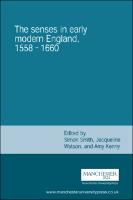The senses in early modern England, 1558–1660
Contributor(s)
Watson, Jackie (editor)
Smith, Simon (editor)
Collection
Knowledge Unlatched (KU)Number
104240Language
EnglishAbstract
This book attempts to interrogate the literary, artistic and cultural output of early modern England. Following Constance Classen's view that understandings of the senses, and sensory experience itself, are culturally and historically contingent; it explores the culturally specific role of the senses in textual and aesthetic encounters in England. The book follows Joachim-Ernst Berendt's call for 'a democracy of the senses' in preference to the various sensory hierarchies that have often shaped theory and criticism. It argues that the playhouse itself challenged its audiences' reliance on the evidence of their own eyes, teaching early modern playgoers how to see and how to interpret the validity of the visual. The book offers an essay on each of the five senses, beginning and ending with two senses, taste and smell, that are often overlooked in studies of early modern culture. It investigates Robert Herrick's accounts in "Hesperides" of how the senses function during sexual pleasure and contact. The book also explores sensory experiences, interrogating textual accounts of the senses at night in writings from the English Renaissance. It offers a picture of early modern thought in which sensory encounters are unstable, suggesting ways in which the senses are influenced by the contexts in which they are experienced: at night, in states of sexual excitement, or even when melancholic. The book looks at the works of art themselves and considers the significance of the senses for early modern subjects attending a play, regarding a painting, and reading a printed volume.
Keywords
Technology & Engineering; Agriculture; GeneralISBN
9781526146465Publisher
Manchester University PressPublisher website
https://manchesteruniversitypress.co.uk/Publication date and place
2020Grantor
Imprint
Manchester University PressClassification
Agriculture and farming


 Download
Download